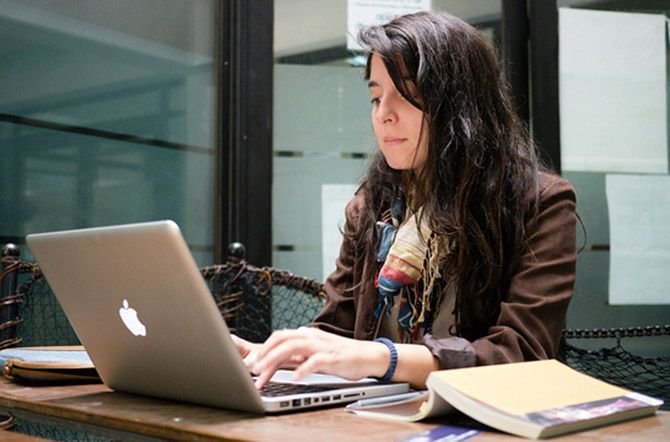Working while studying is an incredible way to build your professional network, learn hands-on experience, and understand the global working environment, suggests Ajay Sharma, president and founder, Abhinav Immigration Services.

Studying abroad is a rewarding opportunity for students who wish to receive a quality education, explore cultures, seek employment and settle abroad.
Every overseas study destination presents a unique experience to students with loads of amenities.
Other than offering job opportunities while they are studying, it gives a chance to adventure seekers who can go out and explore new cultures, traditions, cuisines, people and geographies.
Working while studying is an incredible way to build your professional network, learn hands-on experience, and understand the global working environment.
It teaches students time management, makes them resilient and allows them to pursue their dream with renewed vigour.
While on-campus jobs place students inside the university in administrative roles, careers service, students' union, library and shops, off-campus jobs include bar attendant, restaurant waiter, assistants, retail helper, etc.
How to work while studying
Part-time job: This is the most popular way of working while studying which helps students to clear off their educations loans.
Part-time jobs are flexible and provide a decent wage. Most university campuses, restaurants, and call centres offer part-time jobs to students in various roles.
Summer or winter vacation jobs: Apart from part-time jobs, most countries allow students to work full-time during the academic breaks or summer or winter vacations.
They can work at holiday resorts and restaurants and build a network leading to better career opportunities for the coming years.
Internships: If they wish to land in their dream organisation, an internship is the safest bet.
Students can get both paid and unpaid work opportunities within an organization of their choice.
Work placements: Many foreign universities allow work placement as a part of the study program.
Such jobs are unpaid but students can gain experience and develop long-term skills.
Volunteering: The primary purpose of this type of work is to identify social problems and help the community in a better way.
Here, volunteers receive real-world experience and make industry connections. Such roles are highly valued and lead to job recommendations.
Working and Studying: Know the rules in top nations
Almost all popular study destinations allow international students to take up part-time jobs while studying.
Presenting some of the top countries and their varying rules and regulations:
The United States of America
The US Student Visa (F1) allows students to get an education from registered universities, colleges, language training programs, high schools, and other institutions.
Students who want to work part-time during a semester must consult with the designated school official (DSO).
The officer can help them to get jobs and make them understand the norms. Primarily, there are two types of opportunities: on-campus and off-campus.
Students with F1 visas can work up to 20 hours a week and full-time (up to 40 hours per week) during school breaks or vacation in on-campus jobs.
However, to work off-campus, the permission is often limited to some training programs.
After one academic year, students can opt for Curricular Practical Training (CPT) or Optional Practical Training (OPT) to gain experience in their respective field of study.
United Kingdom
Under UK Student Visa, international students pursuing full-time degree courses can work 20 hours/week or full-time during vacations.
However, Student Visa holders cannot be self-employed, do business, pursue a full-time job, or work as an entertainer, or as a dentist or a doctor.
Students can opt for work placement if it is an integral part of the course. After completing the course, students can apply for a graduate visa to pursue full-time employment for two years.
To renew, students can switch to a skilled worker visa and attain permanent residency in the U.K. upon completing five years in the country.
Canada
Out of all the countries, Canada has one of the most flexible visa regulations.
The Canada Student Visa allows students to work on and off-campus without any restrictions, except the work hours should be limited to 20 hours/week during academic sessions, otherwise, it can be full-time.
They must acquire Social Insurance Number (SIN) to work off-campus.
After completing the study, applying for a post-graduate work permit will allow students to achieve full-time employment for two to three years.
Post that, after meeting residency requirements, students can attain permanent residency.
Germany
Under the German Student Visa, non-EU/EEA students can study for 120 full days or 240 half days per year.
However, if students take on-campus job roles such as student assistant or research assistant, they are exempted from this limit.
Moreover, students can pursue internships and earn up to €45 per month which will be non-taxable.
Once they are done with their courses, students can apply for an E.U. blue card for 18 months.
Switzerland
In Switzerland, students can work 15 hours/week during the academic semester and full-time during holidays. But students can only start work after the first six months of their academic year.
In addition to this, students must convince their employers to process work permit applications for them to get work permits.
The Netherlands
Students studying in the Netherlands can work up to 16 hours/week full-time during June, July, and August.
In both scenarios, a student must acquire a work permit from his employer.
Right after finishing college, students can work for one year without a work permit.
France
Non-EU students in France can work 964 hours a year, equivalent to 60 per cent of the full-time position. However, they must have a residence permit in France to work part-time in the country.
The government has mandated a minimum wage for all, which is around EUR 7.61/hour.









